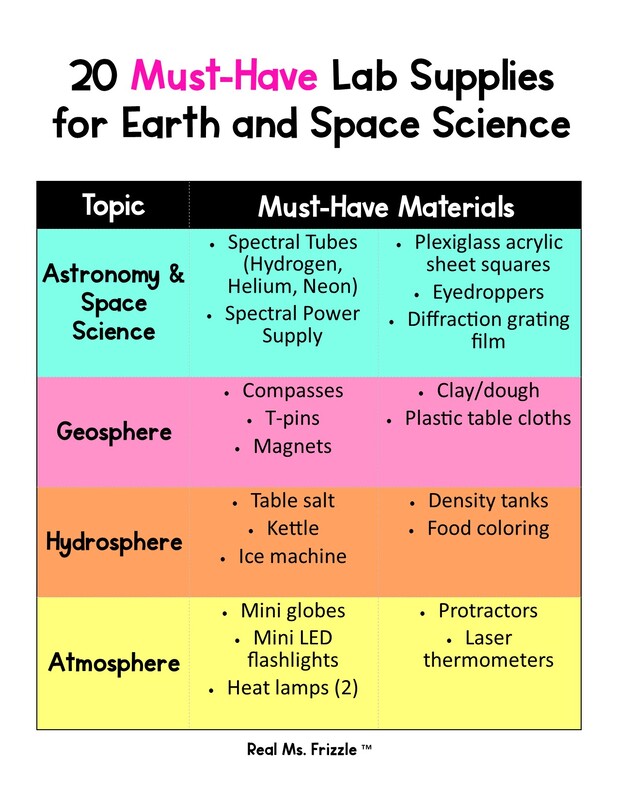|
The unfortunate thing about teaching is that you rarely have control over your own teaching schedule. If you've been a science teacher more than two years you have likely been thrown into a new curriculum. My own experience was to graduate in Biology with a teaching degree, only to accept a job in integrated science (a mix of physics, chemistry, biology, and earth science). Not only did I not understand some of the Earth Science topics that I was about to teach, but I had ZERO idea about what materials would help me. It is not uncommon for biology teachers to pick up a chemistry class period, or for a physics teacher to be asked to take on an astronomy elective. Let me share with you my 20 MUST-HAVE lab materials for a successful Earth Science year. This is not an all-inclusive list, and it is not a list of free materials. These are the materials that helped illustrate the most difficult topics of the curriculum. At the time of this blog publication all of these materials will cost about $600. But you'll be surprised which of these materials you already have in your storage room! Stay tuned for specific information about how I used these materials for my Earth Science lessons. This list will cover labs about:
Check back for updates and links to these ideas.
1 Comment
The first day of school is KEY to building relationships and engaging students in your content. It took me a long time to figure out the balance between these two things. Over the years I found that the majority of my junior high school students (age 12-15) were incredibly anxious those first few days. We tried a variety of get-to-know-you games that required students to move around the room, but the conversations were brief, forced, and awkward. So what to do? I wanted students to get engaged in our Earth Science curriculum and I desperately wanted to get to know each student. Other teachers had shared "All About Me" worksheets related to their content areas, so I thought I'd try one too!
In the past, this worksheet is historically only available in my Earth Science Full Curriculum Bundle, but you can grab it for free when you head to the link below: Lesson planning is without a doubt the most time consuming part of teaching. I would regularly spend 4-5 hours planning a single lesson. I had a format that I thought was working: vocab, notes, worksheet. In retrospect, I was the Sage on the Stage for at least 35 of the 70 minute class periods.
What I didn't realize was this one thing: Knowledge. Is. Cheep. These students can Google the answer to anything. They can look up a video or picture of any concept. They have Alexa, Siri, YouTube, and even TikTok as resources. My students did NOT need me to give them information. So let's rethink "lesson planning." I was traditionally planning a list of things for the students to DO. They would DO vocabulary. They would DO notes. They would DO a worksheet. I never thought about what I wanted students to LEARN. And how were they going to learn it? And how would I know they learned it? Lesson planning should start with what you want the students to learn based on your required curriculum. Look for the NOUNS and the VERBS. Let's look over this example from my state's core: "Analyze and interpret data to construct an explanation for the changes in Earth’s formation and 4.6 billion year history." Now we want to design a lesson that helps students learn the nouns by way of the verbs. There is a way to do this where students take charge of their own learning. In the end, it is the students who will be doing more work than you! Here are some of the ways you could do this:
Each of these ideas requires just 10-20 minutes of prep time (and possibly just as long for you to learn the right answers ahead of time), but can take students an entire class period. All you need to do is to help redirect the students when they are on the wrong path or have questions! Next time you are stumped with your lesson planning, look for opportunities for students to figure it out on their own. They do not need knowledge bestowed upon them. They need the chance to do the groundwork and synthesize their learning. |
AuthorI love teaching Earth and Space Science, and I love helping other teachers do the same Archives
February 2023
Categories |
skipper_coates@hotmail.com




 RSS Feed
RSS Feed